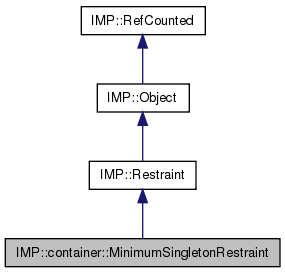The score is evaluated for each of the Singletons in the container and the value of the minimum n scores is used. That is, if n is 1, the value of the restraint is the value of the minimum score over the container.

Public Member Functions | |
| ContainersTemp | get_input_containers () const |
| ParticlesTemp | get_input_particles () const |
| ParticlesList | get_interacting_particles () const |
| virtual std::string | get_type_name () const |
| virtual ::IMP::VersionInfo | get_version_info () const |
| MinimumSingletonRestraint (SingletonScore *f, SingletonContainer *c, unsigned int n=1, std::string name="MinimumSingletonRestraint %1%") | |
| void | set_n (unsigned int n) |
| Set the number of lowest scores to use. | |
| virtual double | unprotected_evaluate (DerivativeAccumulator *accum) const |
Friends | |
| template<class T > | |
| void | IMP::internal::unref (T *) |
| IMP::container::MinimumSingletonRestraint::MinimumSingletonRestraint | ( | SingletonScore * | f, | |
| SingletonContainer * | c, | |||
| unsigned int | n = 1, |
|||
| std::string | name = "MinimumSingletonRestraint %1%" | |||
| ) |
n is the number of minimum scores to use.